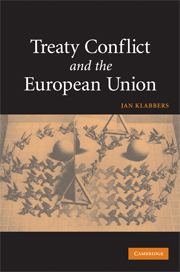Book contents
5 - Post-Vienna Convention developments
Published online by Cambridge University Press: 03 February 2010
Summary
Zuleeg and the principle of political decision
Since judicial decisions can be found supporting the rule that the earlier treaty in time prevails,1 as well as the later in time, it is probably no coincidence that the vast majority of academic authors writing on treaty conflict has come to adhere to the formula of the Vienna Convention: in the end, if a treaty conflict occurs and it cannot be resolved through interpretation, then the state facing irreconcilable commitments will simply have to choose which one to honour, while engaging state responsibility towards the state losing out. As German doctrine refers to it, in a term apparently coined by Manfred Zuleeg, this is the ‘principle of political decision’ (‘Das Prinzip der Politischen Entscheidung’): the state concerned simply has to make a political decision which commitment to prefer.
Zuleeg came to formulate the principle of political decision by and large by default: a systematic analysis of various situations and of the various possible maxims (lex prior; lex posterior; lex specialis; hierarchy; the ‘principle of pith and substance’, and the principle of legislative intent) revealed that no single rule could satisfactorily be applied to situations involving varied partners. Either it was the case that the rule appealed to things which were difficult to realise in a horizontal system such as international law (think of a hierarchy principle), or they would run counter to the third party rule (pacta tertiis nec nocent nec prosunt – no obligations or rights shall be created for third parties without their consent.
- Type
- Chapter
- Information
- Treaty Conflict and the European Union , pp. 88 - 112Publisher: Cambridge University PressPrint publication year: 2008



